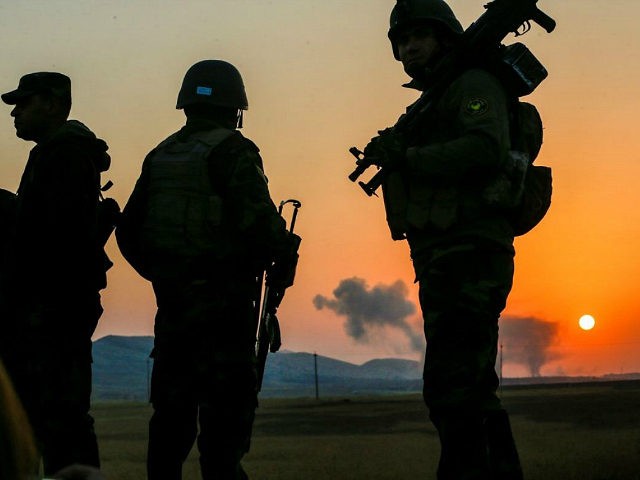U.S. government and military leaders have begun the mission to convince the government of Turkey that cooperating with Syrian Kurdish militias, which Ankara considers terrorist elements, is the only way to defeat the Islamic State in its self-proclaimed capital, Raqqa.
The Syrian Democratic Forces (SDF), a coalition of fighters in Rojava (Syrian Kurdistan), announced over the weekend that they had begun an operation to eradicate the Islamic State from Raqqa. Turkey has rejected the Kurds’ participation in such a mission for years, as Raqqa is not part of Rojava and traditionally home to an Arab, not Kurdish, ethnic population. The Pentagon, which has long maintained a cooperative partnership with the Kurdish forces in Syria, had also rejected the idea of their participation in Raqqa for this very reason.
American Chairman of the Joint Chiefs of Staff Joseph Dunford is currently in Ankara, attempting to convince his Turkish counterparts that a multi-ethnic military coalition is necessary to ensure that the Islamic State is permanently defeated.
“We always knew the SDF wasn’t the solution for holding and governing Raqqa. What we are working on now is to find the right mix of forces for the operation,” Dunford told reporters. He argued that the SDF, while predominantly Kurdish, was ethnically diverse, home to “over 12,000 Arab fighters.”
“[This operation needs] a predominantly Arab and Sunni Arab force. And there are forces like that. There is the moderate Syrian opposition, the vetted Syrian forces and the Free Syrian Army forces, and there is some initial outreach to forces in Raqqa proper,” Dunford said.
Last week, Pentagon chief Ashton Carter told reporters that the operation to liberate Raqqa would begin “within a matter of weeks” and must occur simultaneously with the fight to liberate Mosul, Iraq, the Islamic State’s regional capital in that country. Turkish President Recep Tayyip Erdogan spent weeks trying to convince his Iraqi counterpart, Haider al-Abadi, to permit Turkish troops to participate in that operation, though Abadi never recanted, and their exchanges devolved into personal insults rather than strategic disagreements.
Erdogan has insisted in a Turkish presence in Raqqa since September to prevent the Syrian Kurdish forces from entrenching themselves in the Arab city.
Turkey considers the SDF an extension of the Kurdistan Workers’ Party (PKK), a U.S.-designated Marxist terrorist group. Ankara does maintain friendly relations with the Iraqi Kurdistan Regional Government (KRG) and its militia, the Peshmerga, which have played a pivotal role in the liberation of Mosul. The Iraqi operation, however, is the product of cooperation with a more diverse coalition including the Kurds, Iraqi soldiers, and Iran-backed Shiite militias.
Both Turkey and Kurdish militias have accused each other of “ethnic cleansing” in areas where they have successfully uprooted the Islamic State.
The Syrian Democratic Forces announced the Raqqa operation over the weekend, ensuring they had 30,000 fighters on hand to challenge the Islamic State. The operation is reportedly code-named “The Wrath of the Euphrates” and would consist of “first liberating the countryside around Raqqa and isolating the city, and secondly taking control of the city.”
“The fight will not be easy, and will require accurate and careful operations because IS will defend its bastion knowing that the loss of Raqqa will mean it is finished in Syria,” SDF spokesman Talal Sello told the Agence-France Presse.
Both France and Great Britain will provide the Kurds air support.

COMMENTS
Please let us know if you're having issues with commenting.